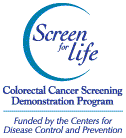|
|
||||||||||||||||
|
|
|
|
|
|||||||||||||
|
|
Control and Prevention Division of Cancer Prevention and Control 4770 Buford Hwy, NE MS K-64 Atlanta, GA 30341-3717 Call: 1 (800) CDC-INFO TTY: 1 (888) 232-6348 FAX: (770) 488-4760 E-mail: cdcinfo@cdc.gov Submit a Question Online |
|
|
|
Preventive Cancer Screening and VaccinationScreening means checking your body for cancer before there are signs or symptoms of the disease. The routine performance of screening tests may find many kinds of cancer early, when treatment is likely to work best. Screening for Breast, Gynecologic, and Colon CancersCDC supports screening for breast, cervical, and colorectal (colon) cancers as recommended by the U.S. Preventive Services Task Force.
Breast Cancer Cervical Cancer The U.S. Food and Drug Administration approved a human papillomavirus (HPV) vaccine for females aged 9–26 to prevent cervical cancer. However, the HPV vaccine does not substitute for routine cervical cancer screening (Pap tests), according to recommended screening guidelines. For more information, visit Basic Information about Cervical Cancer. Vaginal and Vulvar Cancers 
Colorectal (Colon) Cancer The Colorectal Cancer Screening Demonstration Program offers free or low-cost screening at five sites. Screening for Lung, Ovarian, Prostate, and Skin CancersScreening for lung, ovarian, prostate, and skin cancers has not been shown to reduce deaths from those cancers. Lung Cancer Ovarian Cancer Prostate Cancer Skin Cancer Related Links
*Links to non-Federal organizations found at this site are provided solely as a service to our users. These links do not constitute an endorsement of these organizations or their programs by CDC or the Federal Government, and none should be inferred. CDC is not responsible for the content of the individual organization Web pages found at these links.
Page last reviewed: November 5, 2008
Page last updated: November 5, 2008 Content source: Division of Cancer Prevention and Control, National Center for Chronic Disease Prevention and Health Promotion |
|||||||||||||||||||||||||||||||||||||||||||||||||||||||||||||||||||
|
||||||||||||
|